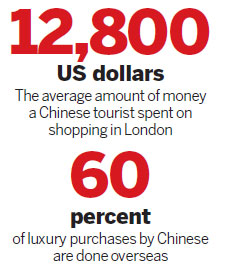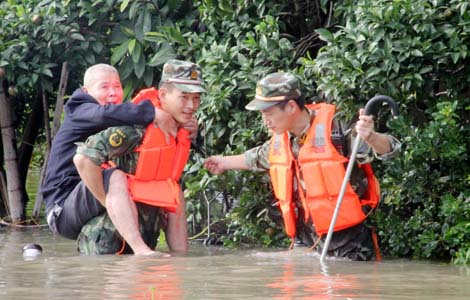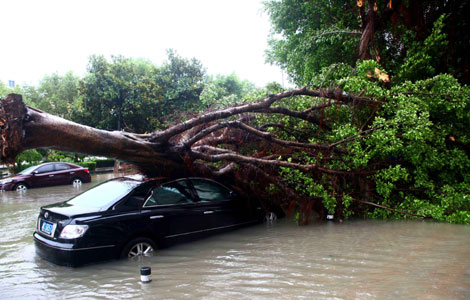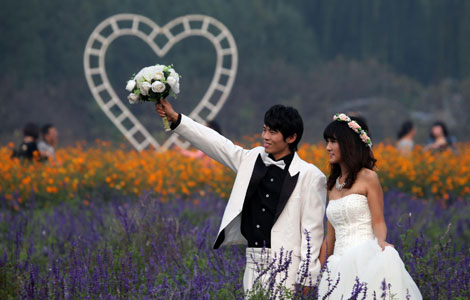

Many of the world's swanky shops went Chinese last week.
They adorned their premises with welcoming banners in Chinese, huge floral displays and red drapes, for just one reason: The Chinese shoppers were coming.
 |
With the holiday over and Chinese tourists back home, the merchants are counting their money and most are finding that their efforts paid off.
In London, Chinese tourists spent an average of $12,800 on shopping, higher than the former record holders from the oil-rich Middle-East countries, according to the Daily Mail.
Stories of conspicuous consumption of Chinese visitors abound in Rome, Milan and many other places, including Liechtenstein, a tiny principality between Austria and Switzerland.
With various strains of Chinese dialects filling the air, shop assistants bent over backward for customers and clutched credit cards carefully between both hands as if holding a gift.
The more thoughtful fashion houses in Paris employed special tea masters to prepare the perfect cup of longjing tea for their Chinese guests.
The overriding image of Chinese tourists on Jeju island in South Korea is one of busloads of shoppers heading for the luxury boutiques in the Shilla duty free store, said Quan Yuefang, a tour guide with Nanjing-based Tuniu.com, an online travel agency.
"South Korea is becoming a new shopping darling for Chinese, notably those from eastern China, who are mostly tired of trips to Hong Kong or Southeast Asia," said Quan, who has been leading tour trips to the country for five years.
The growing number of approved destination status agreements, a strong yuan, and a speedier visa process — a visa-free policy in the case of Jeju — are luring more price-savvy mid-class earners, Quan said.
South Korea was the most appealing destination for Chinese due to its proximity as well as its comprehensive and trendy product lines, according to a report by the United Nations World Tourism Organization in April.
Huang Cijiang, 28, from Shanghai, followed the droves of customers into a cosmetics booth in downtown Seoul, enticed by large Chinese language signs promoting a discount of 50 percent.
Working for an insurance company, Huang snapped up three packs of facial masks for her and her friends after she purchased a $1,800 Celine bag.
"I found the latest models here. Most designer brands are cheaper than Hong Kong, and it seems to be a more cost-effective option to fly to South Korea or Japan than the likes of Paris," Huang said.
Chinese tourists remained the most generous spenders among all overseas tourists in Japan, with average spending reaching $2,300 between April and June, nearly three times that of South Korean tourists, according to the Japan National Tourism Organization.
The China Tourism Academy estimated that 65 percent of the travel budgets of outbound Chinese tourists were for shopping.
Some 60 percent of luxury purchases by Chinese are done outside the Chinese mainland, according to a report by consultancy Bain & Co. Big-ticket items on the mainland can be 30 to 40 percent more expensive than in Hong Kong due to luxury and import taxes as well as pricing strategies.
The United Nations World Tourism Organization forecast Chinese travel would reach 100 million outbound trips by 2020. Their outbound spending in 2013 is expected to reach $117.6 billion, up 20 percent from the previous year.
Chinese-tailored services have boomed as well.
Okinawa, the southernmost prefecture of Japan that boasts beautiful sandy beaches and crystal clear water for diving, has also installed China UnionPay card terminals in most shops and hotels. UnionPay cardholders can spend without currency exchange fees at hotels and shops, ranging from Lawson convenience stores to shopping centers such as Ashibinaa, an outlet mall near the airport.
At the Laox electronics store in Ashibinaa, Chinese-speaking attendants greeted customers with ni hao, and recommended a complete line of popular items favored by Chinese, ranging from Hitachi facial moisturizer massagers to Panasonic rice cookers.
Masseuses in Thai spa centers are conversant with such Mandarin phrases as tang xia (lay down), teng bu teng (does it hurt?) and shu fu ma (feel comfortable?).
The number of Chinese visitors to Thailand surged from 1.8 million in 2011 to 2.8 million in the first eight months of 2013, according to the Tourism Authority of Thailand.
Contact the writers at hewei@chinadaily.com.cn and luhaoting@chinadaily.com.cn
Du Xiaoying contributed to this story.







